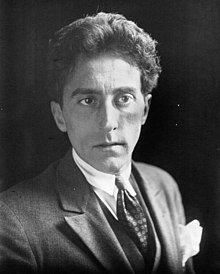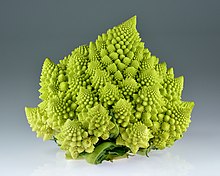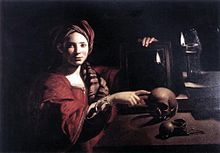Jean Cocteau
Appearance

Jean Maurice Eugène Clément Cocteau (5 July 1889 – 11 October 1963) was a French poet, novelist, painter, and filmmaker.
Quotes
[edit]





- I have a piece of great and sad news to tell you: I am dead.
- "Visite" in Discours du Grand Sommeil (1920); later published in Collected Works Vol. 4 (1947)
- A prig always finds a last refuge in responsibility.
- The Wedding on the Eiffel Tower (1922), Preface
- I am a lie who always speaks the truth.
- "Le Paquet Rouge" in Opéra (1925)
- The Louvre is like the morgue; one goes there to identify one’s friends.
- "Le Secret Professionnel" in Le Rappel à l’Ordre (1922; 1926)
- Variant: The Louvre is a morgue; you go there to identify your friends.
- As quoted by Roger Shattuck in "A Native Son of Paris", Jean Cocteau and the French Scene (1984)
- Poets don’t draw. They unravel their handwriting and then tie it up again, but differently.
- Dessins (1924), as quoted by Pierre Chanel in "A Thousand Flashes of Genius", Jean Cocteau and the French Scene (1984)
- True realism consists in revealing the surprising things which habit keeps covered and prevents us from seeing.
- Le Mystère Laïc (1928); later published in Collected Works Vol. 10 (1950)
- Wealth is an inborn attitude of mind, like poverty. The pauper who has made his pile may flaunt his spoils, but cannot wear them plausibly.
- Les Enfants Terribles translation by Rosamond Lehmann (1929)
- Mystery has its own mysteries, and there are gods above gods. We have ours, they have theirs. That is what’s known as infinity.
- "Anubis" to the Sphinx, in Act 2 of The Infernal Machine (1932); Collected Works Vol. 5 (1948)
- Depuis le jour de ma naissance, ma mort s'est mise en marche. Elle marche à ma rencontre, sans se presser.
- The day of my birth, my death began its walk. It is walking toward me, without hurrying.
- "Postambule" in La Fin du Potomac (1939); later published in Collected Works Vol. 2 (1947)
- One of the characteristics of the dream is that nothing surprises us in it. With no regret, we agree to live in it with strangers, completely cut off from our habits and friends.
- "Du Rêve" in La Difficulté d’Etre [The Difficulty of Being] (1947)
- What is line? It is life. A line must live at each point along its course in such a way that the artist’s presence makes itself felt above that of the model... With the writer, line takes precedence over form and content. It runs through the words he assembles. It strikes a continuous note unperceived by ear or eye. It is, in a way, the soul’s style, and if the line ceases to have a life of its own, if it only describes an arabesque, the soul is missing and the writing dies.
- "De la Ligne" in La Difficulté d’Etre [The Difficulty of Being] (1947)
- Film will only become an art when its materials are as inexpensive as pencil and paper.
- As quoted in The Super 8 Book (1975) by Lenny Lipton (ed. Chet Roaman); also in Aesthetic Aspects of Recent Experimental Film (1980) by Barry Walter Moore, Garth S. Jowett, p. 6
- After the writer’s death, reading his journal is like receiving a long letter.
- On the journal of Franz Kafka; diary entry (7 June 1953); Past Tense: Diaries Vol. 2 (1988)
- Man seeks to escape himself in myth, and does so by any means at his disposal. Drugs, alcohol, or lies. Unable to withdraw into himself, he disguises himself. Lies and inaccuracy give him a few moments of comfort.
- "On Invisibility" in Diary of an Unknown (1953)
- An artist cannot speak about his art any more than a plant can discuss horticulture.
- As quoted in Newsweek (16 May 1955) Variant translation: Asking an artist to talk about his work is like asking a plant to discuss horticulture.
- The trouble about the Académie is that by the time they get around to electing us to a seat, we really need a bed.
- On his election to Académie Française (1955)
- We must believe in luck. For how else can we explain the success of those we don’t like?
- On his election to Académie Française (1955) Variant translation: Of course I believe in luck. How else does one explain the successes of one's enemies?
- What is history after all? History is facts which become lies in the end; legends are lies which become history in the end.
- As quoted in The Observer (22 September 1957)
- The poet never asks for admiration; he wants to be believed.
- Newsweek (7 April 1958)

- Poetry is indispensable — if I only knew what for.
- As quoted in The Necessity of Art (1959) by Ernst Fischer, Ch. 1
- Art produces ugly things which frequently become more beautiful with time. Fashion, on the other hand, produces beautiful things which always become ugly with time.
- As quoted in New York World Telegram & Sun (21 August 1960); also in Threads: My Life Behind the Seams in the High-Stakes World of Fashion (2004) by Joseph Abboud, p. 79
- A film is a petrified fountain of thought.
- Esquire magazine (February 1961)
- The ear disapproves but tolerates certain musical pieces; transfer them into the domain of our nose, and we will be forced to flee.
- As quoted in An Encyclopedia of Quotations About Music (1981) by Nat Shapiro, p. 130
- You’ve never seen death? Look in the mirror every day and you will see it like bees working in a glass hive.
- As quoted by Ned Rorem The Dick Cavett Show (PBS) (6 October 1981)
- Commissions suit me. They set limits. Jean Marais dared me to write play in which he would not speak in the first act, would weep for joy in the second and in the last would fall backward down a flight of stairs.
- Vogue (May 1983)
- That pile of paper on his left side went on living like the watch on a dead soldier’s wrist.
- On his visit to the deathbed of Marcel Proust, as quoted in "Cocteau: The Great Enchanter" by Edmund White Vogue (May 1984)
- I have lost my seven best friends, which is to say God has had mercy on me seven times without realizing it. He lent a friendship, took it from me, sent me another.
- Vogue (May 1984)
- Don’t for a moment believe He was killing the young; He was costuming angels.
- Vogue (May 1984)
- He has the manner of a giant with the look of a child, a lazy activeness, a mad wisdom, a solitude encompassing the world.
- On Orson Welles, as quoted in The New York Times (11 October 1985)
- There are too many souls of wood not to love those wooden characters who do indeed have a soul.
- On marionettes, as quoted in The New York Times (15 February 1987)
- The instinct of nearly all societies is to lock up anybody who is truly free. First, society begins by trying to beat you up. If this fails, they try to poison you. If this fails too, they finish by loading honors on your head.
- As quoted in Moments of Clarity (2002) by Thomas L. Jackson, p. 88
- The skin of all of us is responsive to gypsy songs and military marches.
- As quoted in Slonimsky's Book of Musical Anecdotes (2002) by Nicolas Slonimsky, p. 33
- Mirrors would do well to reflect a little more before sending back images.
- As quoted in Geary's Guide to the World's Great Aphorists (2007) by James Geary, p. 159
- The joy of youth is to disobey, but the trouble is that there are no longer any orders.
- As quoted in Geary's Guide to the World's Great Aphorists (2007) by James Geary, p. 271
Le Coq et l’Arlequin (1918)
[edit]- Later published in Le Rappel à L’Ordre (1926) and Collected Works Vol. 9 (1950)

- When a work appears to be ahead of its time, it is only the time that is behind the work.
- What the public criticizes in you, cultivate. It is you.
- Art is science made clear.
- One must be a living man and a posthumous artist.
- An original artist is unable to copy. So he has only to copy in order to be original.
- All good music resembles something. Good music stirs by its mysterious resemblance to the objects and feelings which motivated it.
- The worst tragedy for a poet is to be admired through being misunderstood.
- In Paris, everybody wants to be an actor; nobody is content to be a spectator.
- Tact in audacity is knowing how far you can go without going too far.
- Variant translation: Tact in audacity consists in knowing how far we may go too far.
- The extreme limit of wisdom — that’s what the public calls madness.
- If it has to choose who is to be crucified, the crowd will always save Barabbas .
- There are truths which one can only say after having won the right to say them.
- We shelter an angel within us. We must be the guardians of that angel.
- Also quoted in Diary of an Unknown (1991) as translated by Jesse Browne.
- Look out! Be on your guard, because alone of all the arts, music moves all around you.
A Call to Order (1926)
[edit]- Le Rappel à l’Ordre (1926)

- Such is the role of poetry. It unveils, in the strict sense of the word. It lays bare, under a light which shakes off torpor, the surprising things which surround us and which our senses record mechanically.
- "Le Secret Professionnel" (originally published 1922); later published in Collected Works Vol. 9 (1950)
- Mettez un lieu commun en place, nettoyez-le, frottez-le, éclairez-le de telle sorte qu'il frappe avec sa jeunesse et avec la même fraîcheur, le même jet qu'il avait à sa source, vous ferez œuvre de poète. Tout le reste est littérature.
- Take a commonplace, clean it and polish it, light it so that it produces the same effect of youth and freshness and originality and spontaneity as it did originally, and you have done a poet’s job. The rest is literature.
- "Le Secret Professionnel" (originally published 1922); later published in Collected Works Vol. 9 (1950)
- A true poet does not bother to be poetical. Nor does a nursery gardener scent his roses.
Opium (1929)
[edit]
- Victor Hugo was a madman who thought he was Victor Hugo.
- Life is a horizontal fall.
- Everything one does in life, even love, occurs in an express train racing toward death. To smoke opium is to get out of the train while it is still moving. It is to concern oneself with something other than life or death.
- A car can massage organs which no masseur can reach. It is the one remedy for the disorders of the great sympathetic nervous system. … The craving for opium can be endured in a car.
- If a hermit lives in a state of ecstasy, his lack of comfort becomes the height of comfort. He must relinquish it.
- There is always a period when a man with a beard shaves it off. This period does not last. He returns headlong to his beard.
- If an addict who has been completely cured starts smoking again he no longer experiences the discomfort of his first addiction. There exists, therefore, outside alkaloids and habit, a sense for opium, an intangible habit which lives on, despite the recasting of the organism.... The dead drug leaves a ghost behind. At certain hours it haunts the house.
- It is not I who become addicted, it is my body.
Diary of an Unknown (1988)
[edit]
- Diary of an Unknown (1988) as translated by Jesse Browner


- Respect movements, flee schools.
- Do as the beautiful woman: see to your figure and your petticoats. Though, of course, I am not speaking literally.
- People would say to Al Brown: "You are not a boxer. You are a dancer." He laughed at this, and won.
- Do not take up cause against the inaccuracies printed about you. They are your protection.
- Be a constant outrage to modesty There is nothing to fear: modesty is exercised only among the blind.
- One is either judge or accused. The judge sits, the accused stands. Live on your feet.
- Hasten slowly. Run faster than beauty.
- Find first, seek later.
- Be helpful, even if it compromises you.
- Compromise yourself. Obscure your own trail.
- He who is affected by an insult is infected by it.
- Understand that some of your enemies are amongst your best friends.
- Fight any instinct to be humorless, for humorlessness is the worst of all absurdities.
- Do not fear being ridiculous in relation to the ridiculous.
- See your disappointments as good fortune. One plan's deflation is another's inflation.
- Do not close the circle. Leave it open. Descartes closes the circle. Pascal leaves it open. Rousseau's triumph over the encyclopedists is to have left his circle open when they closed theirs.
- Allow the power of the soul to grow as flagrant as the power of sex.
- Expect neither reward nor beatitude. Return noble waves for ignoble.
- Hate only hatred.
- Disavow anyone who provokes or accepts the extermination of a race to which he does not belong.
- Be a mere assistant to your unconscious. Do only half the work. The rest will do itself.
- Consider metaphysics as an extension of the physical.
- Know that your work speaks only to those on the same wavelength as you.
- Anything of any importance cannot help but be unrecognizable, since it bears no resemblance to anything already known.
- The ultimate politeness in art consists of speaking only to those who are able to uncover and measure its relationships. Anything else is symbolic, and symbolism is merely transcendental imagery.
On Invisibility
[edit]- Poetry, being elegance itself, cannot hope to achieve visibility. In that case, you ask me, of what use is it? Of no use. Who will see it? No one. Which does not prevent it from being an outrage to modesty, though its exhibitionism is squandered on the blind. It is enough for poetry to express a personal ethic, which can then break away in the form of a work. It insists on living its own life. It becomes the pretext for a thousand misunderstandings that go by the name of glory...
- Beauty is always the result of an accident. Of a violent lapse between acquired habits and those yet to be acquired. It baffles and disgusts. It may even horrify. Once the new habit has been acquired, the accident ceases to be an accident. It becomes classical and loses its shock value.
- Man seeks to escape himself in myth, and does so by any means at his disposal... unnable to withdraw into himself, he disguises himself. Lies and inaccuracy give him a few moments of comfort, the trifling feeling of escape experienced at a masked ball. He distances himself from that which he feels and sees. He invents. He transfigures. He mythifies. He creates. He fancies himself an artist. He imitates, in his small way, the painters he claims are mad.
- Accuracy is vexing to a crowd of would-be fantasizers. Hasn't our age coined the term "escapism," when in fact the only way to escape oneself is to allow oneself to be invaded?
- Poetry is a religion without hope. The poet exhausts himself in its service, knowing that, in the long run, a masterpiece is nothing but the performance of a trained dog on very shaky ground.
- Poetry is an ethic. By ethic I mean a secret code of behavior, a discipline constructed and conducted according to the capabilities of a man who rejects the falsifications of the categorical imperative.
This personal morality may appear to be immorality itself in the eyes of those who lie to themselves, or who live a life of confusion, in such a manner that, for them, a lie becomes the truth, and our truth becomes a lie...
- Beauty cannot be recognized with a cursory glance.
Misattributed
[edit]
- The reward of art is not fame or success but intoxication: that is why so many bad artists are unable to give it up.
- Cyril Connolly in The Unquiet Grave (1944; 1951), Part 2
- Originality consists in trying to be like everybody else — and failing.
- Raymond Radiguet, who was quoted by Cocteau in his acceptance speech to the Académie Française (October 1955)
Quotes about Cocteau
[edit]- I met a young man of nineteen or twenty, who at that time vibrated with all the youth of the world. This was Jean Cocteau, then a passionately imaginative youth to whom every great line of poetry was a sunrise, every sunset the foundations of the Heavenly City.
- Edith Wharton in A Backward Glance (1934), p. 285
External links
[edit]- Brief biography at Kirjasto (Pegasos)
- Jean Cocteau at SensesOfCinema.com
- Jean Cocteau at studiocleo.com
- "The Orphic Trilogy" at brightlightsfilm.com
- The Jean Cocteau Website (unofficial)
- Tribute pages
- Cocteau art
- Watch Jean Cocteau's Blood of a Poet
- Jean Cocteau on IMDb
- Cocteau/cinema Bibliography at UC Berkeley
- Find-A-Grave profile for Jean Cocteau
- Open Directory links


